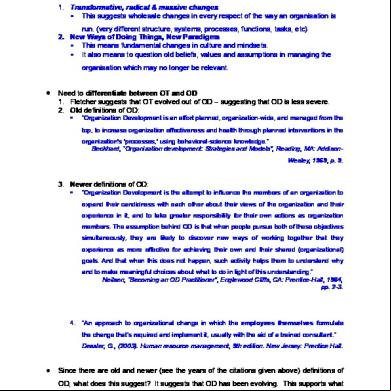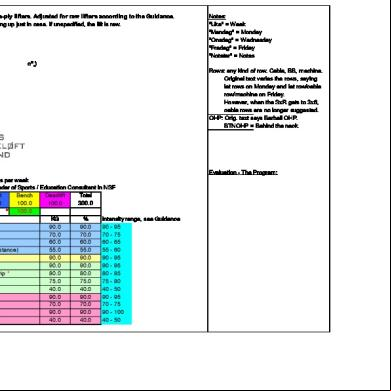Organisational Transformation Vs Organisational Development Notes 4y3w6b
This document was ed by and they confirmed that they have the permission to share it. If you are author or own the copyright of this book, please report to us by using this report form. Report 2z6p3t
Overview 5o1f4z
& View Organisational Transformation Vs Organisational Development Notes as PDF for free.
More details 6z3438
- Words: 574
- Pages: 2
Notes on Organisational Transformation vs Organisational Development Organisational Transformation 1. Transformative, radical & massive changes This suggests wholesale changes in every respect of the way an organisation is run. (very different structure, systems, processes, functions, tasks, etc) 2. New Ways of Doing Things, New Paradigms This means fundamental changes in culture and mindsets. It also means to question old beliefs, values and assumptions in managing the organisation which may no longer be relevant.
Need to differentiate between OT and OD 1. Fletcher suggests that OT evolved out of OD – suggesting that OD is less severe. 2. Old definitions of OD:
“Organization Development is an effort planned, organization-wide, and managed from the top, to increase organization effectiveness and health through planned interventions in the organization's 'processes,' using behavioral-science knowledge.” Beckhard, “Organization development: Strategies and Models”, Reading, MA: AddisonWesley, 1969, p. 9.
3. Newer definitions of OD:
“Organization Development is the attempt to influence the of an organization to expand their candidness with each other about their views of the organization and their experience in it, and to take greater responsibility for their own actions as organization . The assumption behind OD is that when people pursue both of these objectives simultaneously, they are likely to discover new ways of working together that they experience as more effective for achieving their own and their shared (organizational) goals. And that when this does not happen, such activity helps them to understand why and to make meaningful choices about what to do in light of this understanding.” Neilsen, “Becoming an OD Practitioner”, Englewood Cliffs, CA: Prentice-Hall, 1984, pp. 2-3.
4. “An approach to organizational change in which the employees themselves formulate the change that’s required and implement it, usually with the aid of a trained consultant.” Dessler, G., (2003). Human resource management, 9th edition. New Jersey: Prentice Hall.
Since there are old and newer (see the years of the citations given above) definitions of OD, what does this suggest? It suggests that OD has been evolving. This s what Fletcher mentioned about OT being evolved out of OD. Fletcher however suggests that
such evolution is dramatic rather than a slow progress. There are 5 significant approaches to OT. What are they? Page 1 of 2
1. Organisational Culture Change (Waddell et. al.) can affect strategy formation, implementation and performance positively senior managers must diagnose the existing culture and make changes Not easy –deals with changing fundamental beliefs, values and assumptions that shape organisational behaviour. These are close to people’s hearts, has strong
inertia and momentum. Likely need a traumatic experience to alter. Could be a long-drawn process, perhaps more suitable for transactional rather
than transformational change. 2. Self-deg organisations (Waddell et. al.) Organisations that are able to transform themselves in response to their changing environments. Responsibility of change is internal to implement new structures & processes. Need broad based participation. 3. Organisational Learning Approach (Wardell et. al.; Senge) Aim is continuous improvement amidst changing circumstances. Identifying problems and developing strategies to correct them. 4. Appreciative enquiry – IDEAS (Barret & Fry) An approach that learns from successes to emulate for the future 5. Technology and Organisational Transformation (Barret & Fry) Previously technology was used to re-engineer (transform) organisations. Shift is now away from technical changes to more overall changes in school systems.
Page 2 of 2
Need to differentiate between OT and OD 1. Fletcher suggests that OT evolved out of OD – suggesting that OD is less severe. 2. Old definitions of OD:
“Organization Development is an effort planned, organization-wide, and managed from the top, to increase organization effectiveness and health through planned interventions in the organization's 'processes,' using behavioral-science knowledge.” Beckhard, “Organization development: Strategies and Models”, Reading, MA: AddisonWesley, 1969, p. 9.
3. Newer definitions of OD:
“Organization Development is the attempt to influence the of an organization to expand their candidness with each other about their views of the organization and their experience in it, and to take greater responsibility for their own actions as organization . The assumption behind OD is that when people pursue both of these objectives simultaneously, they are likely to discover new ways of working together that they experience as more effective for achieving their own and their shared (organizational) goals. And that when this does not happen, such activity helps them to understand why and to make meaningful choices about what to do in light of this understanding.” Neilsen, “Becoming an OD Practitioner”, Englewood Cliffs, CA: Prentice-Hall, 1984, pp. 2-3.
4. “An approach to organizational change in which the employees themselves formulate the change that’s required and implement it, usually with the aid of a trained consultant.” Dessler, G., (2003). Human resource management, 9th edition. New Jersey: Prentice Hall.
Since there are old and newer (see the years of the citations given above) definitions of OD, what does this suggest? It suggests that OD has been evolving. This s what Fletcher mentioned about OT being evolved out of OD. Fletcher however suggests that
such evolution is dramatic rather than a slow progress. There are 5 significant approaches to OT. What are they? Page 1 of 2
1. Organisational Culture Change (Waddell et. al.) can affect strategy formation, implementation and performance positively senior managers must diagnose the existing culture and make changes Not easy –deals with changing fundamental beliefs, values and assumptions that shape organisational behaviour. These are close to people’s hearts, has strong
inertia and momentum. Likely need a traumatic experience to alter. Could be a long-drawn process, perhaps more suitable for transactional rather
than transformational change. 2. Self-deg organisations (Waddell et. al.) Organisations that are able to transform themselves in response to their changing environments. Responsibility of change is internal to implement new structures & processes. Need broad based participation. 3. Organisational Learning Approach (Wardell et. al.; Senge) Aim is continuous improvement amidst changing circumstances. Identifying problems and developing strategies to correct them. 4. Appreciative enquiry – IDEAS (Barret & Fry) An approach that learns from successes to emulate for the future 5. Technology and Organisational Transformation (Barret & Fry) Previously technology was used to re-engineer (transform) organisations. Shift is now away from technical changes to more overall changes in school systems.
Page 2 of 2










